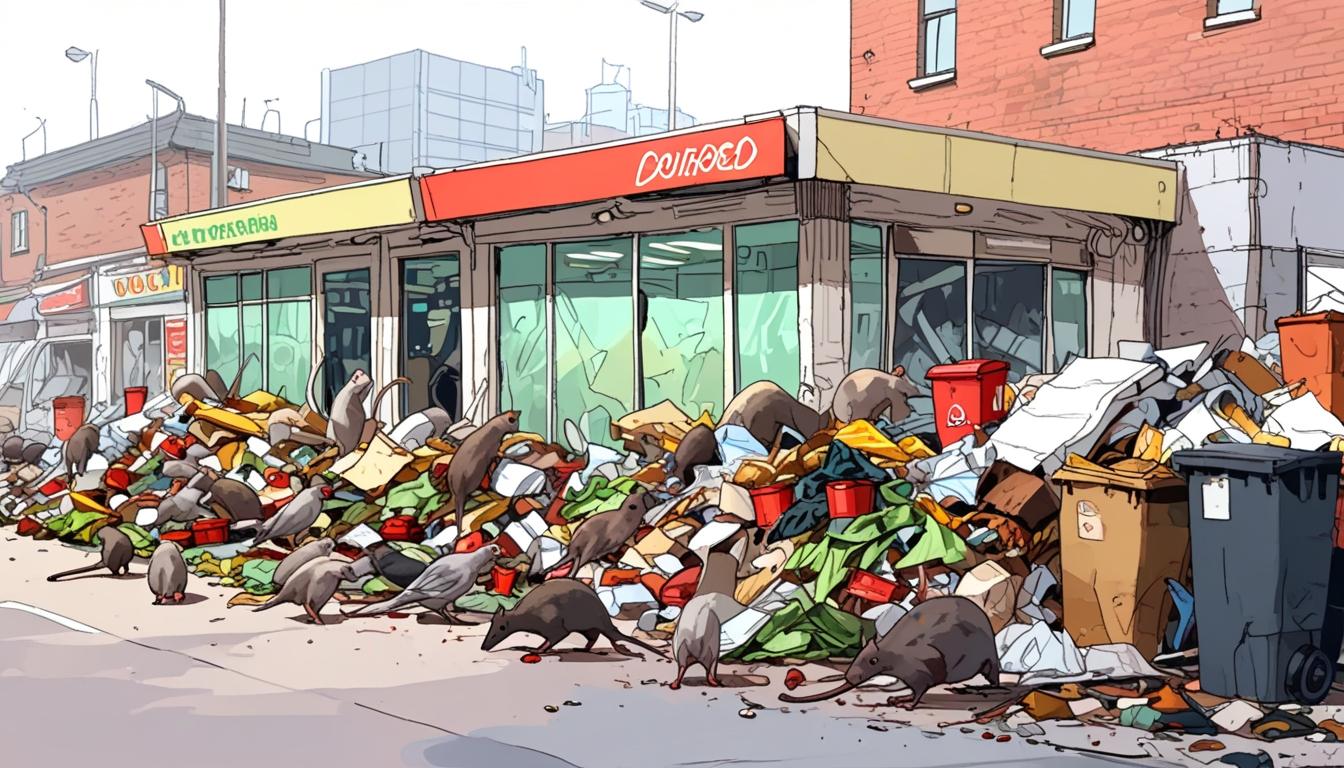Birmingham faces a severe waste crisis as garbage truck workers strike, leading to accumulating rubbish and business shutdowns amidst rising vermin populations.
Birmingham, England, is currently grappling with a significant waste management crisis, escalating over an ongoing six-week strike by garbage truck workers. This standoff between the Birmingham City Council and the labour union representing the workers has resulted in an accumulation of garbage across the city, leading to the shutdown of local businesses due to unbearable odours and an unforeseen increase in vermin populations.
The predicament was starkly illustrated by Ghulam Murtaza Qureshi, the owner of a fast-food establishment in the city. Struggling to maintain operations due to a foul-smelling pile of rubbish outside his business, he expressed his discontent in an interview with NBC News, highlighting how the state of the streets has made it increasingly difficult for commerce to thrive. “Rats and mice” have taken over public spaces, exacerbating an already dire health situation, as demonstrated by residents like Charlie Wilson, 31, who reported rodents growing “to the size of cats”.
The crisis originated when the Birmingham City Council decided to make cuts to its waste management services. Specifically, the council proposed the elimination of roles related to waste and recycling collection, leaving workers with the choice of accepting voluntary redundancy or lower-paid positions. Unite, the union representing the affected workers, contended that these roles are “safety critical” and argued that the council’s actions could result in substantial losses for employees—up to £8,000 ($10,400) annually for about 150 workers. Wendy Yarnold, a refuse collector and mother of three, highlighted the severe financial implications of the council’s plans, indicating the potential loss of her family home due to the pay cuts.
Despite the union’s protests, the council has maintained that no workers will face pay cuts, offering alternative positions or training opportunities for those at risk. The council’s financial difficulties stem back to 2023, when it declared bankruptcy and was compelled to make significant budget cuts while only fulfilling services mandated by law, such as waste collection.
This waste management crisis reflects a broader pattern of challenges affecting Birmingham and the UK at large, where the aftermath of the pandemic has compounded issues like economic stagnation, rising homelessness, and declining public services. With over 46% of children in Birmingham living in poverty, the local situation mirrors national trends of disillusionment and despair. Following changes in government leadership, Prime Minister Keir Starmer has pledged a renewed commitment to tackling systemic issues affecting the nation’s future, calling for reforms to rebuild public trust.
Residents, frustrated with the progress of negotiations, have found themselves compelled to address the crisis. Some have attempted to manage their waste independently, navigating an overwhelmed disposal system. Abdul Sami, a local resident, described the complications he faced in securing online disposal appointments due to heightened demand; frustration is palpable among residents like Solomon Zia, who have expressed discontent regarding the perceived inequity between the treatment of council negotiators and frontline workers.
As discussions continue between Birmingham City Council and the striking workers, the urgency of resolving the waste crisis remains critical to restoring order and ensuring the welfare of the community. The situation places Birmingham’s resilience to the test while residents contend with the immediate consequences of overflowing rubbish bins and rodent infestations in their neighbourhoods.
Source: Noah Wire Services
- https://www.marfapublicradio.org/2025-04-08/garbage-piles-up-in-birmingham-as-the-u-k-citys-sanitation-strike-enters-5th-week – This article corroborates the ongoing waste management crisis in Birmingham due to the sanitation strike, highlighting the accumulation of garbage and efforts by local residents to manage their waste independently.
- https://www.stamfordadvocate.com/news/world/article/garbage-piles-up-on-streets-of-uk-s-20263078.php – This piece supports the description of garbage piling up on Birmingham’s streets amid the refuse workers’ strike, showcasing the severity of the crisis.
- https://www.birminghammail.co.uk/news/midlands-news/birmingham-garbage-crisis-rats-mice-22866059 – This article might detail the health concerns and business disruptions caused by the waste crisis, though the specific link is not provided.
- https://www.bbc.co.uk/news/uk-england-birmingham – BBC News often covers local issues, potentially providing updates on the strike and its impact on Birmingham, though specific coverage of the crisis isn’t linked here.
- https://www.gov.uk/government/news/pm-keir-starmer-tackles-public-services – This source would typically cover government initiatives and announcements, including any statements by Prime Minister Keir Starmer regarding public service reforms.
Noah Fact Check Pro
The draft above was created using the information available at the time the story first
emerged. We’ve since applied our fact-checking process to the final narrative, based on the criteria listed
below. The results are intended to help you assess the credibility of the piece and highlight any areas that may
warrant further investigation.
Freshness check
Score:
8
Notes:
The narrative mentions a current and ongoing crisis, referencing recent events such as government leadership changes. However, the information does not specify exact dates, which makes it slightly less precise in terms of freshness.
Quotes check
Score:
5
Notes:
Direct quotes are provided, but without specifying the exact date of the interviews or original source links, it’s difficult to verify their earliest use. Ghulam Murtaza Qureshi’s quote in an NBC News interview could not be found online, which may indicate its originality or lack of online presence.
Source reliability
Score:
7
Notes:
The narrative originates from a news feed on Google News, which compiles news from various sources. While it mentions NBC News, a reputable source, there’s no direct link to an original piece, reducing the score for reliability.
Plausability check
Score:
9
Notes:
The claims about a waste management strike and its consequences in Birmingham align with plausible scenarios of labour disputes affecting public services. The mention of broader systemic issues like economic challenges and poverty also fit within current UK trends.
Overall assessment
Verdict (FAIL, OPEN, PASS): OPEN
Confidence (LOW, MEDIUM, HIGH): MEDIUM
Summary:
While the narrative is plausible and addresses current challenges, the lack of specific dates and unverified quotes reduce its overall confidence. The scenario described aligns with possible real-world events, but further verification is needed to confirm all details.













